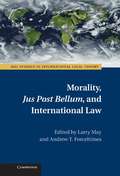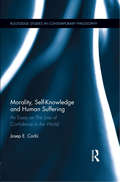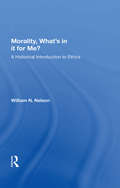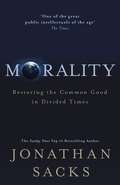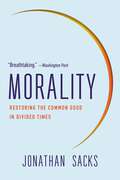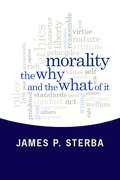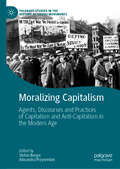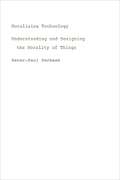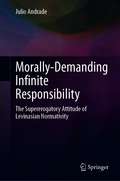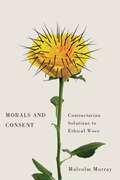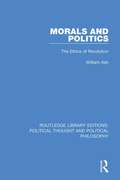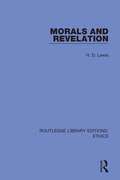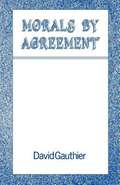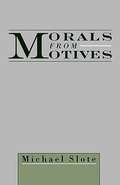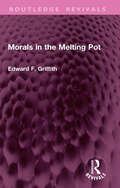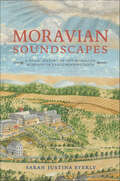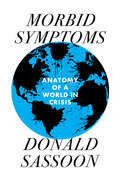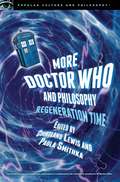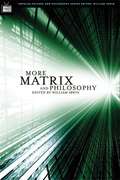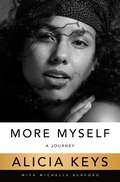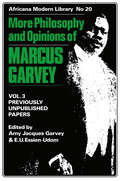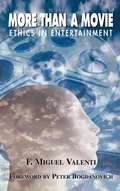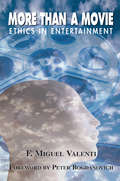- Table View
- List View
Morality, Jus Post Bellum, and International Law
by Larry May Andrew T. ForcehimesThis collection of essays brings together some of the leading legal, political and moral theorists to discuss the normative issues that arise when war concludes and when a society strives to regain peace. In the transition from war, mass atrocity or a repressive regime, how should we regard the idea of democracy and human rights? Should regimes be toppled unless they are democratic or is it sufficient that these regimes are less repressive than before? Are there moral reasons for thinking that soldiers should be relieved of responsibility so as to advance the goal of peace building? And how should we regard the often conflicting goals of telling the truth about what occurred in the past and allowing individuals to have their day in court? These questions and more are analyzed in detail. It also explores whether jus post bellum itself should be a distinct field of inquiry.
Morality, Self Knowledge and Human Suffering: An Essay on The Loss of Confidence in the World (Routledge Studies in Contemporary Philosophy)
by Josep CorbíIn this wholly original study, Josep Corbi asks how one should relate to a certain kind of human suffering, namely, the harm that people cause one another. Relying upon real life examples of human suffering--including torture, genocide, and warfare--as opposed to thought experiments, Corbi proposes a novel approach to self-knowledge that runs counter to standard Kantian approaches to morality.
Morality: A Historical Introduction To Ethics
by William N. NelsonHow are the demands of morality related to the needs, interests, and projects of people? Are they a burden, or are they good for us? Are they nothing but arbitrary impositions, or should we expect them to be justified? And will the answers to these questions tell us why and whether we should be moral? In this short, accessible text, William Nelson poses these questions in a form appropriate for beginning students and treats them in a way that both they and their teachers will appreciate. In the company of major figures from the history of ethics, Nelson explores the key issues surrounding topics like egoism, altruism, the good life, and the requirements of morality. A special strength of his presentation is the way he demonstrates how the views of these historical figures prefigure the theories espoused by different schools of contemporary thought. Students get not only the historical positions in terms of which contemporary debates are framed but also up-to-date discussions of utilitarianism, contractualism, problems of collective action, and the relations between virtue and duty-based theories. Nelson’s own view that morality is not a single subject matter enables him to show how each of the historical traditions has a role to play in a coherent and defensible pluralistic account of morality. At the core of this pluralism is a commitment to the democratic view that morality must not merely serve practical human purposes, but it must also be justified to the people it governs. Imaginative and insightful, intelligent and informed, this is an excellent first text for students of ethics and the history of ethics.
Morality: An Introduction to Ethics
by Bernard WilliamsBernard Williams's remarkable essay on morality confronts the problems of writing moral philosophy, and offers a stimulating alternative to more systematic accounts which seem nevertheless to have left all the important issues somewhere off the page. Williams explains, analyses and distinguishes a number of key positions, from the purely amoral to notions of subjective or relative morality, testing their coherence before going on to explore the nature of 'goodness' in relation to responsibilities and choice, roles, standards, and human nature. The final chapters make a fascinating enquiry into what morality is about, looking beyond happiness to other human aims and ideals. This re-issue of a classic in moral philosophy includes a new foreword by the author.
Morality: Restoring the Common Good in Divided Times
by Jonathan SacksWe are living through a period of cultural climate change. We have outsourced morality to the markets on the one hand, and the state on the other. The markets have brought wealth to many, and the state has done much to contain the worst excesses of inequality, but neither is capable of bearing the moral weight of showing us how to live. This has had a profound impact on society and the way in which we interact with each other. Traditional values no longer hold, yet recent political swings show that modern ideals of tolerance have left many feeling rudderless and adrift. In this environment we see things fall apart in unexpected ways - toxic public discourse makes true societal progress almost unattainable, a more divisive society is fuelled by identity politics and extremism, and the rise of a victimhood mentality calls for 'safe spaces' but stifles debate. The influence of social media seems all-pervading and the breakdown of the family is only one result of the loss of social capital. Many fear what the future may hold.Delivering a devastatingly insightful critique of our modern condition, and assessing its roots and causes from the ancient Greeks through the Reformation and Enlightenment to the present day, Sacks argues that there is no liberty without morality, and no freedom without responsibility.If we care about the future of western civilisation, all of us must play our part in rebuilding our common moral foundation. Then we will discover afresh the life-transforming and counterintuitive truths that a nation is strong when it cares for the weak, and rich when it cares for the poor.Here is an inspiring vision of a world in which we can all find our place, and face the future without fear.
Morality: Restoring the Common Good in Divided Times
by Jonathan SacksA distinguished religious leader's stirring case for reconstructing a shared framework of virtues and values. With liberal democracy embattled, public discourse grown toxic, family life breaking down, and drug abuse and depression on the rise, many fear what the future holds. In Morality, respected faith leader and public intellectual Jonathan Sacks traces today's crisis to our loss of a strong, shared moral code and our elevation of self-interest over the common good. We have outsourced morality to the market and the state, but neither is capable of showing us how to live. Sacks leads readers from ancient Greece to the Enlightenment to the present day to show that there is no liberty without morality and no freedom without responsibility, arguing that we must all must play our part in rebuilding a common moral foundation. A major work of moral philosophy, Morality is an inspiring vision of a world in which we can all find our place and face the future without fear.
Morality: The Why and the What of It
by James P. SterbaThis book invites philosophers and their students to consider two of the most fundamental questions in moral and political philosophy: Why be moral? And, what does morality require? Distinguished philosopher James P. Sterba presents his unique views on these topics. Sterba first argues from rationality to morality and then from morality to substantial equality. Prominent scholars Charles W. Mills, Candace A. Vogler, Anita Superson, Russ Shafer-Landau, Allan F. Gibbard, Gerald Gaus, and Tibor Machan provide thought-provoking critical responses. In the final part, Sterba addresses these critiques, inviting readers to explore the various arguments and reach their own conclusions on these fundamental questions of moral and political philosophy. Morality: The Why and What of It is an essential text for all students and scholars of ethics and political philosophy.
Moralizing Capitalism: Agents, Discourses and Practices of Capitalism and Anti-Capitalism in the Modern Age (Palgrave Studies in the History of Social Movements)
by Stefan Berger Alexandra PrzyrembelThis book adds a crucial focus on morality to the growing literature on the history of capitalism by exploring social and cultural perspectives on the economic order that has dominated the modern world. Taking the study beyond narrow economic confines, it traces the entanglement between moral sentiments and capitalism, examining both moral critiques and moral justifications. Company bankruptcies, systems of taxation, wealth, and the running of stock exchanges were attacked on moral grounds, while ideas of economic justice and the humanization of capitalism loomed large over moral critiques. Many movements, from antislavery to labour campaigns, were inspired by aspirations to improve capitalism and halt the moral decay that was felt to have affected large sections of society. This book questions how moral sentiments are defined and have changed over time, and how these relate to both capitalism and anti-capitalism. Covering a range of different social movements and ethical issues, the 13 chapters present a moral history of capitalism, understood not simply as an economic system but as an order that encompasses all areas of modern life.
Moralizing Technology: Understanding and Designing the Morality of Things
by Peter-Paul VerbeekTechnology permeates nearly every aspect of our daily lives. Cars enable us to travel long distances, mobile phones help us to communicate, and medical devices make it possible to detect and cure diseases. But these aids to existence are not simply neutral instruments: they give shape to what we do and how we experience the world. And because technology plays such an active role in shaping our daily actions and decisions, it is crucial, Peter-Paul Verbeek argues, that we consider the moral dimension of technology. Moralizing Technology offers exactly that: an in-depth study of the ethical dilemmas and moral issues surrounding the interaction of humans and technology. Drawing from Heidegger and Foucault, as well as from philosophers of technology such as Don Ihde and Bruno Latour, Peter-Paul Verbeek locates morality not just in the human users of technology but in the interaction between us and our machines. Verbeek cites concrete examples, including some from his own life, and compellingly argues for the morality of things. Rich and multifaceted, and sure to be controversial, Moralizing Technology will force us all to consider the virtue of new inventions and to rethink the rightness of the products we use every day.
Moralizing the Italian Marvellous in Early Modern England (Anglo-Italian Renaissance Studies)
by Alessandra Petrina Beatrice FugaThis volume breaks new ground in the exploration of Anglo-Italian cultural relations: it presents analyses of a wide range of early modern Italian texts adapted into contemporary English culture, often through intermediary French translations. When transposed into English, their Italian origin was frequently categorized as marvellous and consequently censured because of its strangeness: thus, English translators often gave their public a moralized and tamed version of Italy’s uniqueness. This volume’s contributors show that an effective way of moralizing Italian custom was to exoticize its origins, in order to protect the English public from an Italianate influence. This ubiquitous moralization is visible in the evolution of the concept of tragedy, and in the overtly educational aim acquired by the Italian novella, adapted for an allegedly female audience. Through the analysis of various literary genres (novella, epic poem, play, essay), the volume focuses on the mechanisms of appropriation and rejection of Italian culture through imported topoi and narremes.
Morally-Demanding Infinite Responsibility: The Supererogatory Attitude of Levinasian Normativity
by Julio AndradeThis book presents a conceptual mapping of supererogation in the analytic moral philosophical tradition. It first asks whether supererogation can be conceptualised in the absence of obligation or duty and then makes the case that it can be. It does so by enlisting the resources of the continental tradition, specifically using the work of Emmanuel Levinas and his notion of infinite responsibility. In so doing the book contributes to the ongoing efforts to create a common ethical terminology between the analytic and continental traditions within moral philosophy. Supererogatory actions are praiseworthy actions that go ‘beyond duty’, and yet are not blameworthy when not performed. In responding to this paradox, moral philosophy either brackets or attempts a reductionism of supererogation. Supererogation is epitomised in the paradigmatic figures of the saint and hero. Yet, most would agree that emulating these figures is too morally demanding. We rightly ask: where does moral obligation end? Is it even possible, or desirable to demarcate such a boundary? Besides the important theoretical issues these questions raise, they also speak to practical ethical dilemmas in the contemporary milieu, as they concern the global wealthy’s responsibility to the poor and the challenges of development aid work.
Morals and Consent: Contractarian Solutions to Ethical Woes
by Malcolm MurrayAn evolutionary defence of contractarian ethics as applied to social norms.
Morals and Politics: The Ethics of Revolution (Routledge Library Editions: Political Thought and Political Philosophy #2)
by William AshFirst published in 1977. Ethics is the most practical branch of philosophy: its immediate concern is with people's actions. Yet most philosophers do little to relate ethics intelligibly to the human situation. In this inquiry into the nature of ethics, William Ash draws on the relevant works of Marx, Engels, Lenin and Stalin to present the theory and practice of Marxist ethics. He offers an explanation of the moral aspect of Marx's dictum: 'The philosophers have only interpreted the world, in various ways; the point, however, is to change it.‘ The book includes, perhaps for the first time in so considered a form, an assessment of Mao Tsetung's contribution to Marxist moral philosophy, together with the ethical implications of such developments in social practice as the Proletarian Cultural Revolution. The author deals with the question of value by analysing the concept of 'good'; with the question of claims on people and things by analysing the concept of 'right'; with the question of the limits and scope of freedom of choice and action by analysing the concept of 'ought'.’ Clearly written in order to 'de-mystify' the subject, the book challenges readers to test the author's enlightened, Marxist approach in terms of the ethical ordering of their own society.
Morals and Revelation
by H. D. LewisOriginally published in 1951, this book discusses morality and religion , with special attention being paid to the theologian Emil Brunner. It critically examines the state of ethical thinking in the first half of the twentieth century and examines the question of freedom and guilt particularly in relation to psychological theories. The issue of collective guilt is also subjected to close analysis. The problem of our knowledge of God is also discussed with the focus on mysticism and revelation.
Morals by Agreement
by David Gauthier'The high point of its author's achievement, and a major work in contemporary moral and political philosophy.' --The Times Higher Education Supplement
Morals from Motives
by Michael SloteMorals from Motives develops a virtue ethics inspired more by Hume and Hutcheson's moral sentimentalism than by recently-influential Aristotelianism. It argues that a reconfigured and expanded "morality of caring" can offer a general account of right and wrong action as well as social justice. Expanding the frontiers of ethics, it goes on to show how a motive-based "pure" virtue theory can also help us to understand the nature of human well-being and practical reason.
Morals in the Melting Pot (Routledge Revivals)
by Edward F. GriffithFirst published in 1948, Morals in the Melting Pot is an important historical reference work addressing some of the age-old moral dilemmas in society. Edward Griffith discusses themes like contraception, sex and religion, divorce, homosexuality, abortion, adolescent problems, preparation for marriage, and extramarital relationships. The author argues for having the capacity to appreciate moral truth and give integrity and purpose to actions which can otherwise become isolated and devoid of meaning and he says that this requires a degree of spiritual awareness which many people seem to ignore or don't even possess. This book will be of interest to scholars and researchers of sociology, ethics and moral philosophy.
Moravian Soundscapes: A Sonic History of the Moravian Missions in Early Pennsylvania (Music, Nature, Place)
by Sarah Justina EyerlyIn Moravian Soundscapes, Sarah Eyerly contends that the study of sound is integral to understanding the interactions between German Moravian missionaries and Native communities in early Pennsylvania. In the mid-18th century, when the frontier between settler and Native communities was a shifting spatial and cultural borderland, sound mattered. People listened carefully to each other and the world around them. In Moravian communities, cultures of hearing and listening encompassed and also superseded musical traditions such as song and hymnody. Complex biophonic, geophonic, and anthrophonic acoustic environments—or soundscapes—characterized daily life in Moravian settlements such as Bethlehem, Nain, Gnadenhütten, and Friedenshütten. Through detailed analyses and historically informed recreations of Moravian communal, environmental, and religious soundscapes and their attendant hymn traditions, Moravian Soundscapes explores how sounds—musical and nonmusical, human and nonhuman—shaped the Moravians' religious culture. Combined with access to an interactive website that immerses the reader in mid-18th century Pennsylvania, and framed with an autobiographical narrative, Moravian Soundscapes recovers the roles of sound and music in Moravian communities and provides a road map for similar studies of other places and religious traditions in the future.
Morbid Symptoms: An Anatomy of a World in Crisis
by Donald SassoonA health check on our corrupt and broken political system by one of our finest historiansThe deadly coronavirus spread across societies already riddled with political ills: rampant xenophobia and corruption, privatisation run amok, Brexiteer vainglory of 'a global Britain', a Euroland dominated by self-proclaimed nasty parties, and in America, the unspeakable Trump. As the acclaimed historian Donald Sassoon observes in this blistering polemic, there were morbid symptoms galore.Sassoon paints an unforgettable picture of our galloping descent into political barbarism, mixing blunt exposé and classical references with an astonishing array of data. Why does the United States proportionately have more civilians owning guns than Yemen, where there is a war on? Why did the UK enter the pandemic with fewer doctors than any EU country except Poland and Romania?In Morbid Symptoms he refuses to abandon what Antonio Gramsci termed the optimism of the will, instead recalling a line from Machiavelli's Istorie fiorentine: 'do not impute past disorders to the nature of the men, but to the times, which, being changed, give reasonable ground to hope that, with better government, our city will have better fortune in the future'.
More Doctor Who and Philosophy
by Courtland Lewis Paula SmithkaMore Doctor Who and Philosophy is a completely new collection of chapters, additional to Doctor Who and Philosophy (2010) by the same editors. Since that first Doctor Who and Philosophy, much has happened in the Whoniverse: a new and controversial regeneration of the Doctor, multiple new companions, a few creepy new enemies of both the Doctor and planet Earth. And the show's fiftieth anniversary! We've learned some astounding new things from the ever-developing story: that the Doctor's number one rule is to lie, that he claims to have forgotten his role in the mass extermination of the Time Lords and the Daleks, that the Daleks do have a concept of divine beauty (divine hatred, of course), and that Daleks may become insane (didn't we assume they already were?) Oh, and the cult of the Doctor keeps growing worldwide, with more cultish fans in the US, more and bigger Who conventions, more viewers of all ages, and more serious treatment by scholars from many disciplines. New questions have been raised and new questioners have come along, so there are plenty of new topics for philosophical scrutiny. Is the "impossible" girl really impossible? Is there anything wrong with an inter-species lesbian relationship (the kids weren't quite ready for that in 1963, but no one blinks an eye in 2015)? Can it really be right for the Doctor to lie and to selectively forget? We even have two authors who have figured out how to build a TARDIS-instructions included! (Wait, there's a catch, no . . . ?) And then there's that old question that just won't go away: why does the Doctor always regenerate as a male, and is that ever going to change? An added feature of this awesome new volume is that the editors have reached out to insiders of Who fandom, people who run hugely successful Who conventions, play in Who-inspired bands, and run wildly popular podcasts and websites, to share their privileged insights into why the Doctor is so philosophically deep. No more spoilers. It's time for the truly thoughtful travelers in both time and space to rev up the TARDIS once more. . . . Allons-y, Alonzo!
More Matrix and Philosophy: Revolutions and Reloaded Decoded
by William IrwinMostly American scholars of philosophy offer their insights into the trilogy of Matrix movies as a single entity, through the first section engages the critical bashing of the two sequels. Freedom and reality, global philosophy unplugged, and social and political issues are the other themes. Among specific topics are the Prozac of the people, the music of the future, the cosmological journey of Neo, and whether Morpheus is Black.
More Myself: A Journey
by Alicia KeysThis book is part autobiography, part narrative documentary. The author’s journey is revealed not only through her own candid recounting, but also through vivid recollections from those who have walked alongside her. The result is a 360-degree perspective on Alicia’s path, from her girlhood in Hell’s Kitchen and Harlem to the process of growth and self discovery that we all must navigate. In this book, the author shares her quest for truth―about herself, her past, and her shift from sacrificing her spirit to celebrating her worth. With the raw honesty that epitomizes the author’s artistry, More Myself is at once a riveting account and a clarion call to readers: to define themselves in a world that rarely encourages a true and unique identity.
More Philosophy and Opinions of Marcus Garvey: Or, Africa For The Africans (New Marcus Garvey Library #No. 9)
by Amy Jacques GarveyFirst published in 2004. Routledge is an imprint of Taylor & Francis, an informa company.
More Than A Movie: Ethics In Entertainment
by E. Miguel ValentiIn More Than a Movie, producer and entertainment attorney F. Miguel Valenti presents a compelling argument for the creative community to consider the consequences of its products, from movies to TV to the Internet. Valenti refrains from attacking the industries in which he himself works, but argues for reflection on the part of those who create media. More Than a Movie takes a pioneering first step toward outlining the issues in an insider fashion, and provides the tools to make ethical decisions about creating for the big and small screens. More Than a Movie is written to stimulate debate in professional and academic arenas, and for the enjoyment of everyone who loves entertainment.
More Than A Movie: Ethics In Entertainment
by Miguel ValentiIn More Than a Movie, producer and entertainment attorney F. Miguel Valenti presents a compelling argument for the creative community to consider the consequences of its products, from movies to TV to the Internet. Valenti refrains from attacking the industries in which he himself works, but argues for reflection on the part of those who create media. More Than a Movie takes a pioneering first step toward outlining the issues in an insider fashion, and provides the tools to make ethical decisions about creating for the big and small screens. Edited by veteran media writer Les Brown and media consultant Laurie Trotta, More Than a Movie is written to stimulate debate in professional and academic arenas, and for the enjoyment of everyone who loves entertainment. The book contains a foreword by noted author and director Peter Bogdanovich, and commentary from producers Christine Vachon and David Brown. Mediascope, a Studio City, California-based media policy organization, commissioned the book upon discovering that ethical discussions seldom occur in film and television schools, although they are staples for studying law, medicine, business and journalism. Issues range from ethnic and gender stereotyping to excessive and gratuitous violence."It's not about censorship -- it's about having a responsibility for what we do," says author Valenti (no relation to MPAA's Jack Valenti). "The book outlines how we are helping to shape societal values and individual behavior with the artistic choices we make." A team of writers from across the nation offer essays: Neil Hickey, editor, Columbia Journalism Review ; Annette Insdorf, Columbia University; Ted Pease, professor and columnist; Jack Pitman, Variety; Martin Koughan, Emmy Award-winning documentarian. The essays in More Than a Movie are interspersed with stories of actual ethical dilemmas told by noted screenwriters, directors and other practitioners in interviews by Manhattan writer Laura Blum.
